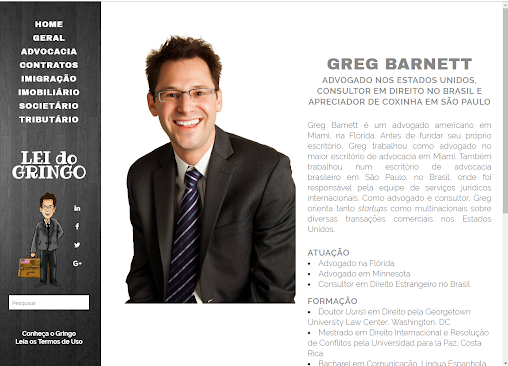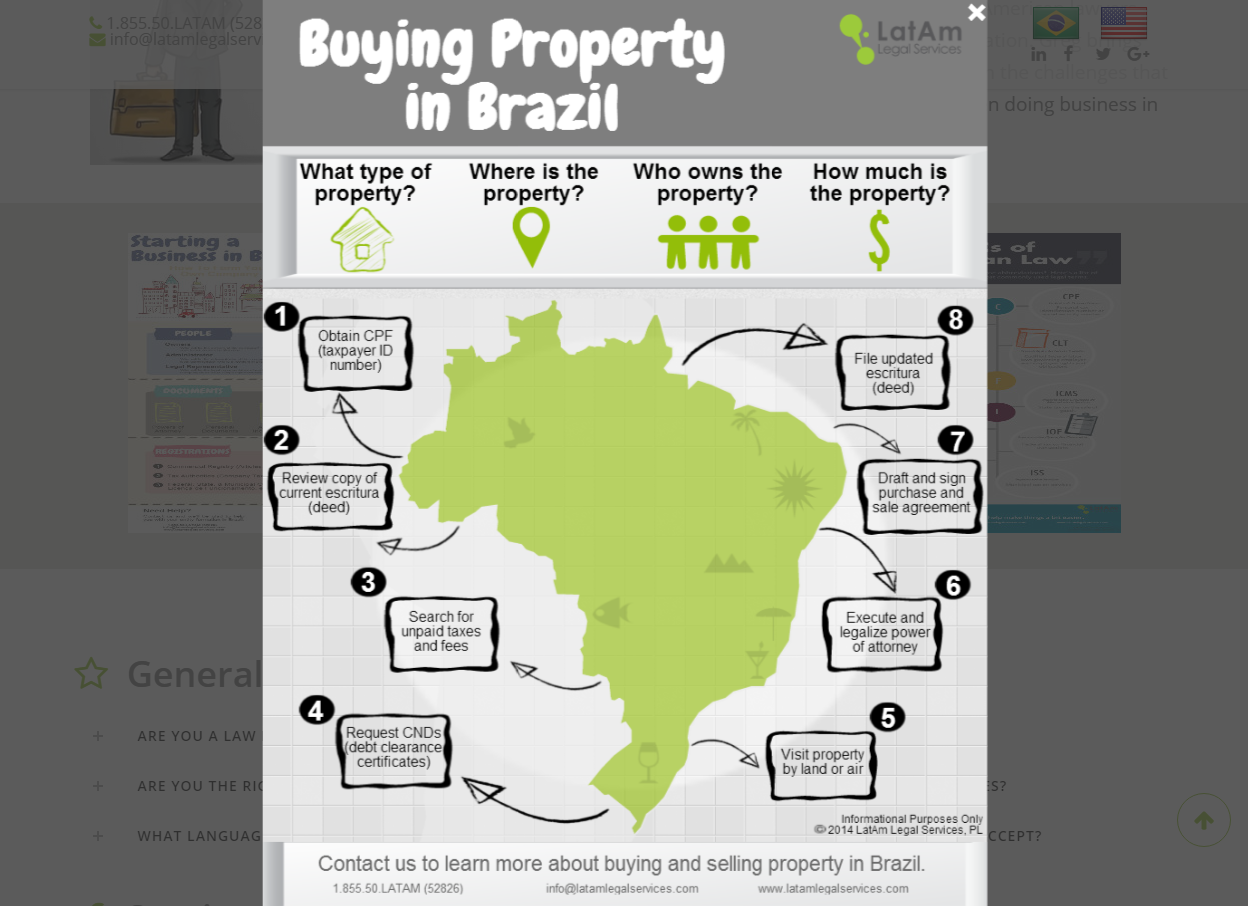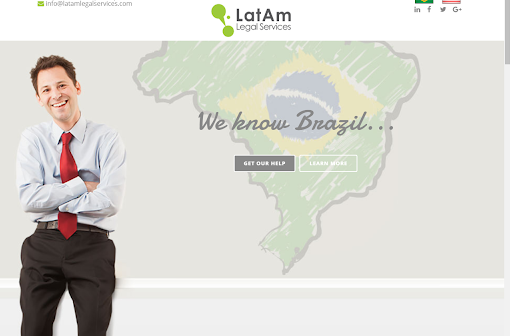This solo traveled a windy road to his current success, and now relies on reputation, blogging, and pay-per-click ads to generate new clients.
Greg Barnett’s first job as a lawyer was one he’d spent his academic career preparing for. He had majored in Spanish at the University of Miami, picked up a master’s degree in international law at Universidad para la Paz in Costa Rica, and a Georgetown J.D.–en route to a job as an associate at Greenberg Traurig, one of the nation’s largest law firms, in its Miami home office, “a hotspot for Latin American transactions.”
The apparent dream job for Barnett lasted just three years. Downsized out of work in the aftermath of the Great Recession, he was in for a rude awakening. In the legal community in Miami, “there is a lot of competition for deals and transactions in Latin America,” he says. “Everyone speaks English and Spanish. I was not unique.”
So Barnett decided to go back to school, this time to study Portuguese in Sao Paulo, Brazil. That change in course would eventually land him back in Miami but in a much less crowded niche and in a job that is a better fit for him: running a solo practice, Lat Am Legal Services, handling business and legal matters involving Brazil.
Recalling the thinking behind his career shift, Barnett notes that in 2011 Brazil was dodging the worst of the Great Recession and was a rising star on the world stage. “And there were very few US lawyers who had lived and worked in Brazil.” Barnett hadn’t either, but he quickly rectified that with the move to Sao Paolo. His stint in language school provided him not only with training in the local language but also an extended student visa, and time to gain a foothold in the country. “While I was taking classes I was reaching out to contacts and meeting people and getting the lay of the land in terms of what opportunities there would be for me after I was done at the university,” says Barnett. He ended up with an offer from Angėlico Advogados, a boutique firm in Sao Paulo that specializes in representing foreigners doing business in Brazil.

Foreign Legal Consultant
Barnett had to apply to the Brazilian bar to become a foreign legal consultant, which required proof of residency, proof of employment with the local law firm, and a letter attesting to his good standing with the Florida bar association. But he did not need to take the Brazilian bar exam or any other test.
As a foreign legal consultant, he says, “you can’t opine on Brazilian law, but you can advise on the law of the U.S. jurisdiction where you are registered to practice, which for me was Florida.” He actually did little of that at Angelico Advogados. He mostly served as a point person for the firm’s foreign clients, reviewing cases, and spotting issues, while “letting our lawyers do the heavy lifting,” he says. “I was learning about Brazilian law through the Brazilian lawyers who were doing the legal work.”
It was a good deal while it lasted, but another economic downturn, this time in Brazil, brought the curtain down on that phase of his career after three years. Barnett soon found himself back in the legal market in Miami, only this time with a credential that set him apart from the pack: his experience inside the Brazilian law firm. “Most of the American lawyers who have worked in Brazil have generally worked at U.S. law firms. They haven’t worked in a Brazilian law firm doing day-to-day general legal work that a Brazilian lawyer would do,” he says. “I realized I could provide clients with added value focused on Brazil based on my experience doing that.”
He had another advantage. “I’m sort of in a unique position because I am not going after the Miami market,” Barnett explains. Many of his clients are Brazilians doing large business transactions in the United States. Others are Americans doing business in Brazil. “Very few of my clients are from Florida.”
About half of his clients find him through the contacts and connections he has cultivated in the years that he has been doing Brazil work, says Barnett, who maintains close but informal ties with Angėlico Advogados. The other half are brought in by his online marketing efforts, on social media and a Portuguese language blog, Lei do Gringo, which means gringo law.

Portuguese Language Blog
Launched after he returned from Brazil, the blog is aimed at Brazilians doing business, studying, and living in the United States. He writes about topics ranging from recent changes in immigration law to the ins and out of owning a timeshare. One issue in particular has generated a lot of work for Barnett. “They get back to Brazil and they realize they can’t get out of the timeshare,” he says. On his blog he explains why, and how he can help.
Barnett doesn’t need to travel to Brazil to land clients. “I find the blog to be more effective. It reaches a broader audience,” he says. “It’s such a niche market that they don’t know where else to go for help, but I’m easy to find in a Google search,” he says.
For landing U.S. clients who are doing business in Brazil, Barnett says Google Adwords and Bing Ads “tend to be the most successful for us because you can really target those folks who are looking for lawyers who can help with Brazil, and there aren’t very many of us.”
Making the Break from Big Law
International law isn’t necessarily the easiest field in which to go solo, Barnett says. “Most international lawyers work for big law firms so there is definitely pressure to look for work in a large law firm.” But he had done that before, and didn’t want to go back to working for other lawyers. “In Brazil I was making decisions, and I was working directly with the clients, which works better for me. That’s what I felt I needed to continue doing when I came back.”
Since he made his break from Big Law, friends and associates have plied him for advice on how they, too, might pull that off. He tells them, first of all, have a niche, “something that other lawyers don’t have.”
Paying attention to the organizational and management aspects of running a practice is also essential. “Make sure you have a plan, and make sure you are going to be able to sustain yourself for a certain amount of time with no work or a small amount of work, because you not only have to be a great lawyer, you have to have a business acumen, and you have to be able to network and bring in clients,” he says.
Next, have a marketing plan, and the gumption to carry it out. “If you don’t have contacts, if you don’t have a good networking Rolodex, you need to make sure that you can get out there and show your face and bring in clients. Otherwise it’s going to be very, very slow and difficult to do,” Barnett warns.
“It takes a certain type of lawyer to start their own law firm, but it’s extremely rewarding when you have clients that continually come to you for their legal work. They’re not coming to you because you’re an attorney at X and Y large law firm in New York. They are coming to you even though you are a small operation because they know you have the experience and knowledge and they trust that the quality of your service is going to match that of any other law firm.”





